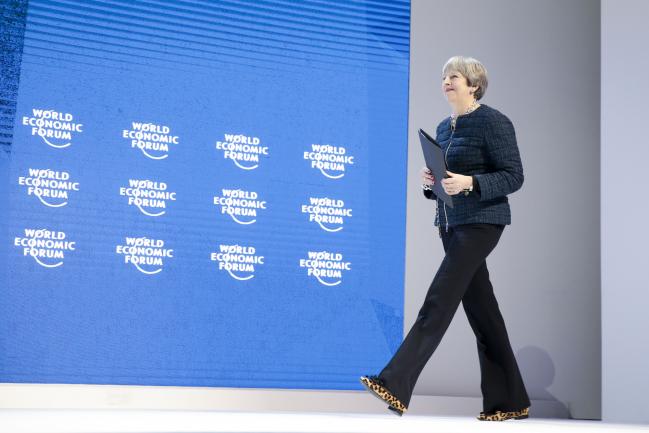(Bloomberg) -- Theresa May’s government backed down and said it will allow lawmakers to see an assessment of the likely impact of Brexit on the British economy, after realizing it was likely to lose a vote.
May told reporters on the plane to China on Tuesday that it would be wrong to release the analysis, which was leaked to Buzzfeed. On landing, she learned that the opposition Labour Party was planning to force a vote on Wednesday calling for lawmakers to be allowed to see the work. With even one of her own ministers calling for its release, May backed down.
Announcing the reversal, Brexit Minister Robin Walker said Wednesday that the government will provide the study to Parliament’s Exiting the European Union Committee and other lawmakers “on a strictly confidential basis,” with a reading room provided. He repeated the government line that the analysis is as yet incomplete and contains “a large number of caveats.”
“It does not yet reflect the government’s policy approaches and does not represent an accurate reflection of the expected outcome of the negotiations,” Walker told Parliament. “It would not be right to describe these as government numbers since they have not had formal government approval or signoff.”
Damaging Impact
According to Buzzfeed, the report said that each of the three scenarios modeled, from no trade deal with the EU to membership of the European Economic Area, would bludgeon growth. The hardest Brexit would leave the economy 8 percent smaller than otherwise in 15 years time, and the softest would still slow growth by 2 percent.
May’s office said the reason the study isn’t complete is that it has no analysis of the goverment’s preferred outcome from the Brexit negotiations. But Conservative lawmaker Anna Soubry told Parliament that this was because “they haven’t worked out what they want.”
Speaker of the House of Commons John Bercow said the analysis should be released “as a matter of urgency.” Nicky Morgan, chair of the Treasury Committee, said it should be made public.
“The document can hardly undermine the government’s negotiating position if it does not consider the government’s desired outcome,” she said in an emailed statement. “On the contrary, transparency about the consequences of the ‘off-the-shelf’ options that have been modeled will stimulate public debate, strengthen the government’s negotiating hand and improve the final deal that is reached between the U.K. and the EU.”
In Trouble
The leak of the analysis has landed two ministers in trouble. Steve Baker had a meeting with his staff on Wednesday morning to discuss his argument to Parliament the previous day that the reports weren’t worthwhile because government civil servants were so bad at making predictions.
“I am not able to name an accurate forecast, and I think that they are always wrong,” Baker told lawmakers Tuesday, when asked specifically about civil service predictions.
These comments were attacked by the civil service labor union, and on Wednesday Baker tweeted that he’d had a “brilliant jolly conversation” with his officials on the value of forecasting. “Happily, they know I still love them and my critique is of economic method, not individuals,” he said.
Meanwhile Justice Minister Philip Lee has been told off by party managers for comments he made on Twitter on Tuesday evening. “The next phase of Brexit has to be all about the evidence,” he wrote. “We can’t just dismiss this and move on. If there is evidence to the contrary, we need to see and consider that too.”
Lee said he supported May’s “mission to make the best” of the “tough cards” she had been dealt. But he said it was “time for evidence, not dogma, to show the way.”
May’s office said Baker hadn’t been disciplined for his comments.
(Updates with calls for analysis to be published quickly from seventh paragraph.)
